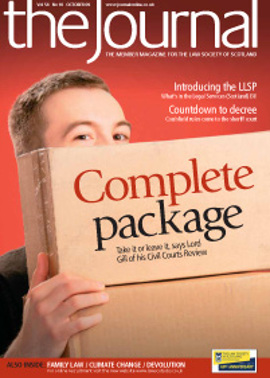Making the most of ABS

With the Scottish Government’s Legal Services Bill now published, it is time to look at the underlying challenges that alternative business structures are likely to throw up. In particular, a number of the questions asked at the ABS workshop at the Society’s Anniversary Conference in May this year raised concerns around a potential loss of independence of the Scottish legal profession and increased commercial pressures from new business partners.
Professional v commercial
I would like to start by dissecting the perceived dichotomy that an organisation cannot be both commercial and professional. Some lawyers seem to hold the view that business people are in some way unethical and sell products and services which their customers either do not want or cannot afford. By comparison, they argue that lawyers provide a high quality service without consideration of the profit element, and defend the client’s position regardless of their own self-interest. They are uncomfortable about directly putting a price on their services and avoid doing so by quoting hourly rates.
However, in recent years, I have worked with a number of professionals who already work in “alternative business structures”, either in joint partnerships or in-house. In my experience, none of them are being forced to compromise their professionalism to accommodate the demands of aggressive commercialisation.
Good business people excel at customer service, work long hours and take considerable risks to ensure the viability of their products and services, and in my view the legal profession could learn a lot about service quality from them, in particular seeing things from the client’s perspective. Few commercial organisations would ask their professionals to behave unprofessionally. Quite apart from the tensions that would create within the organisation, its commercial viability would be damaged as its continued success is based on the quality of its services and the dedication of its people.
When asking professionals and commercial people to work together, it is therefore important to talk through the perceptions that people have of each other. For example, I have worked through these kinds of issues with senior management teams and clinical directors of private hospital boards, and it results in a much clearer understanding of what can be achieved by working together with an agreed frame of reference.
No chief executive would want his or her professional team to compromise the quality of the healthcare provided, as such an approach would result in commercial suicide with poor patient care, bad publicity and professional indemnity claims. Good professionals would simply leave and spread the word around their colleagues not to work there.
I would argue that being commercial is nothing more than making sure that the organisation delivers to its maximum potential. For profit-making businesses, this includes financial rewards and returns, current and future investment and targets. Extending that to not-for-profit organisations, these “commercial” targets may be softer, such as levels of achievement gained by students, or patients treated, but can still result in a much better focus on providing value for the end user.
Opportunities of alternative structures
Surveyors and architects have worked in a multi-discipline way for many years and, with accountants and engineers, are often employees of global professional service deliverers. These use a variety of trading structures ranging from partnerships to limited companies and franchises and all are committed to providing highly professional services. Lawyers currently work in-house in many industrial and commercial sectors without inevitably compromising their professionalism.
I always find it interesting to work with a range of professionals, as often each discipline plays to type. Lawyers are often the profession that adds time delays and costs, accountants fixate on the figures at the expense of business relationship, architects like to concentrate on concepts, and surveyors like to gossip. If we focus on our individual strengths when working together, we will be able to offer clients a much stronger product and overall service. For example, a combined surveyor and architect practice which is well managed will provide a strong design yet practical and cost-effective service. However, without good leadership, it can result in inter-professional bickering and an unhappy client.
As we all know, professionals are not easy to manage, so any new business structure involving professions is going to require strong leadership. First, I want to offer a word of warning. Many solicitors see the introduction of the option of alternative business structures as the chance to have lawyer-led operations, but the other professions are somewhat wary of this as they do not see lawyers as typically being good leaders.
It is also worthwhile noting that while some solicitors may be concerned about the commercial impact on our professionalism, some of the other professions see us as very mercenary. For Scottish solicitors to make the most of the business opportunities offered by alternative structures, we will have to address these concerns if we are to attract good professionals from other disciplines.
Room for improvement
Secondly, most firms now recognise the need for closer working relationships with their clients, and as a result will have had to adapt they way they work to fit in with them especially when it comes to IT and reporting procedures. However this should not have resulted in a loss of independence and integrity. Ensuring that we are integral to their decision making process makes it more difficult for clients to shop about for other law firms to help them. An essential part of what they value is our ability to provide objective advice, so being able to be independent is an important element of what they want from us.
Thirdly, many clients continue to feel that our service falls short of “excellence”. We have only to look at claims and complaints examples to appreciate that some of the service levels provided are not up to the mark. We have a lot to learn from other sectors that operate at a much higher level of quality and consistency. Some of us have yet to make the shift to accepting that it is our clients who are the judges of whether the quality of our service is adequate or not.
Fourthly, once and for all, we need to move away from charging by the hour to charging for the value of what we achieve for our clients. This debate has gone on now for many years, and clients are simply not interested in hearing our excuses that we cannot provide certainty of how long a matter will take. This is one important aspect of becoming commercial that we will need to grasp so that we become able, based on the expertise that we keep telling our clients we have, to give an indication on likely costs. A senior director of a large financial institution I spoke with recently reinforced these comments, explaining to me his irritation that the message still seemed not to have got through to his legal panel firms that he simply wasn’t interested in continuing to hear about how much they charge by the hour and wanted them to focus on getting their overall service levels up.
Priorities for action
Alternative business structures will happen soon and it is essential that Scottish solicitors decide how they will respond to them, as it is more than likely that a number of commercial organisations will want to provide some types of legal services. For those firms who want to take advantage of the opportunities created, it is important to be aware of and address the current perceptions that our clients and other professions have about lawyers in general.
As a result, we need to:
- accept that alternative business structures will soon be introduced and seize the positive opportunities they will provide;
- move away from debating that being commercial is somehow distasteful;
- discuss how our commitment to impartial advice and putting our clients’ interest first can be sold;
- work on our public image so that we are no longer seen as mercenary, high-handed and difficult;
- develop our profile amongst the other professions to show them that we are capable of working collaboratively; and
- focus on what our clients want and set our delivery, quality and service levels accordingly.
In this issue
- The Combined Standard Clauses (2009 edition)
- Preserving a legal inheritance: settlement rights in the "Occupied Palestinian Territories"
- The European Court and the duty to investigate deaths
- Chief Executive's SGM address
- Shelter's online resources
- Musical copyright and contract
- The international swap shop
- Headline fortnight
- The Gill Report? What's not to like?
- Solicitor advocates and conflicts of interest
- Settlement in the West Bank
- Package deal
- RoS = economic value
- Defining the future
- Global leader?
- Dog's chance
- Coulsfield rules OK
- Money and your life
- Experts on the case
- At the hub, 10 years on
- Guardians: don't look to the Fund
- From the Brussels office
- Ask Ash
- Making the most of ABS
- Planning for growth
- The perils of posting
- ARTL: friend or foe?
- Where privacy prevails
- How was it for you?
- Agreeing rescues with creditors
- Adopting new solutions
- Divorce for gender change
- Scottish Solicitors' Discipline Tribunal
- Book reviews
- Website review
- A safe pair of hands tops the bill
- Law out of step






